The worst movie, you say? Argo? The one poised to take home a Best Picture Oscar in two days, which you found to be a wholly inoffensive, exciting little diversion? However is it possible, you wonder, what mad world have I entered? Ben Affleck? That charming, nicely bearded chap, so well-spoken and thoughtful, with intentions clearly so decent and good? Who has already won a heaping steamy pile of shiny awards and accolades, whose political thriller has been lauded as a return to those golden days of yore, when Hollywood made movies for people with brains larger than a turnip? In a year which saw the release of, among other affronts to all things decent in the universe, Journey 2: The Mysterious Island, Ghost Rider: Spirit of Vengeance, The Lorax, American Reunion, Battleship, Abraham Lincoln: Vampire Hunter, Paranormal Activity 4, Life of Pi, and Lincoln?
Yes. Argo. Worst of the lot.
What’s the point of saying American Reunion is terrible? It’s not meant to be anything but. Abraham Lincoln: Vampire Hunter? However awful it is (very, I hear), it’s got no pretensions otherwise. And Battleship was based on a fucking board game. (What’s next in that pipeline, one wonders? Sorry: The Movie? Bonkers?) Argo claws its way to its worst of the year distinction not for being outrageously stupid or incompetent or insulting or cheap, but for its pretensions of intelligence and depth. It is not deep. It is not intelligent. It’s a con, from start to finish.
Argo is billed as a serious, thoughtful, artfully made drama for adults, reminiscent of that great era of probing, meaningful movies, the ‘70s (even opening with the ‘70s Warner Bros. logo; Argo is not subtle). It’s being hailed as an example of great directing (despite Affleck being “snubbed” in not being nominated for a Best Director Oscar). It’s topped best-of lists. It is, simply, Important Cinema. For months we have been so assured.
But I saw Argo. And it is none of those things. It is, rather, in a word, competent. Merely competent. It presses certain familiar buttons. It creates the atmosphere of a smart, tense drama, without actually being one. It has no identifiable style. It has no viewpoint. It is entirely unambiguous in every particular. Once seen, it leaves one with nothing to think about. It makes no lasting impression. It asks of the viewer only to sit and stare, and applaud at the end. So how is Argo anything but a popcorn movie with all the intellectual heft of, well, Battleship? It isn’t.
1. History
Bear with me a moment as I list historical inaccuracies in Argo: the six escaped diplomats weren’t shunned by everyone but the Canadians. The British sheltered them at first, and New Zealand diplomats drove them to the airport. The six, obviously, stayed inside until their escape; they never took a trip through Iran to a bazaar where they could be spotted by, well, everyone. Affleck’s character, Mendez, was never told midway through that the mission was canceled, thereby forcing him to decide to go against his superiors and carry it out anyway. Alan Arkin’s movie producer character, Lester Siegel, was made up. There was no dash to the airport, nor a frantic call to the President to authorize tickets. The tickets were bought beforehand with no trouble. There was no confrontation with airport security, no call to the imaginary film producer in Hollywood, and no army vehicles chasing an airplane.
Now before you say, “So what? It’s a movie. It’s not history. It’s telling the essence of the truth, which is what’s ultimately the most important thing,” let me say that I agree completely. I’m not concerned with historical inaccuracies for how they distort history. History is by definition a version of the past as seen through present eyes, whichever eyes and whichever present it happens to be seen through. I present the above list because it includes every single dramatic moment in the movie. All the drama in the movie is manufactured.
My question, then, is this: what about this story attracted anyone to it if all the drama had to be invented?
2. Fake Drama
The U.S. Embassy in Tehran is stormed. Over 50 diplomats are taken hostage, their fates uncertain. Six escape and hole up with the Canadians until they’re rescued. Their cover story is that they’re filmmakers scouting locations for a science fiction movie called Argo. The CIA sends in a man and the captives escape safely. It sure sounds dramatic. Why then is every dramatic sequence invented?
The drama is invented because the kind of drama invented is easy and simple to invent. Argo is not an intelligent thriller. It is an exceptionally simplistic one. The dramatic moments listed above all have one very important thing in common: they don’t require specific characters. They require only “people” and “events.” The situations are generic. They could appear in any movie. Real drama comes from character. It comes from the audience identifying with characters and what they’re going through. There are no characters to identify with in Argo. There are only “the six diplomats” and Affleck’s affectless CIA agent, Mendez.
The reason for this is as simple as the fake drama itself: creating believable characters is difficult. It takes real work and imagination. It’s not a matter of painting-by-numbers. And you aren’t excused from doing it because your movie is a “true story.” In Argo we are presented with a series of generic, tense sequences, robotically programmed to elicit an audience response, which they do, with the mechanistic reliability and emotional impact of a digital clock.
Look at the scene where Mendez is told the mission has been canceled the night before they’re to leave. Mendez goes to his hotel, and he’s got a bottle of liquor. The liquor tells us he’s stressed out about the situation. Is he an alcoholic? Does liquor signify anything about Mendez specifically? No. We don’t know anything about him. Liquor is a generic signifier. Mendez doesn’t sleep all night long. He thinks. This tells us that the situation is a real stumper for him. He’s awake, he’s drinking, he’s expressionless, he’s in a dimly lit room, and he’s shot in close-up. Serious business. I guess if he was really devasted by the situation he’d turn his shower on and sit in it with his clothes on.
Meanwhile, the six diplomats prepare to leave and stress out about Mendez being late to arrive. The Canadian ambassador looks on, sad at their fate; he knows the mission has been canceled. To create the drama here, Affleck cuts between himself and the diplomats. Back and forth, back and forth. The diplomats growing tenser. Mendez taking another drink. Day dawning. The ambassador looking worried. The diplomats sweating it out. Mendez in ever closer close-ups. And—bam! The door of the house opens, and there’s Mendez, ready to take the diplomats to the airport. As an extra aid to understanding that what’s happening here is tense, the pounding music grows louder and louder throughout this sequence, until finally, reaching a four-beat crescendo, it ends as Mendez enters the house. As someone who notices movie music, especially when it’s being shoved into my earholes, I knew to the second when this “tension sequence” would end.
Try this. Imagine two intercut scenes. In one, a fat man rides a power mower over his large front lawn. In the other, a piece of cheddar cheese sits on a countertop. Got it? Now imagine intercutting between those two scenes. The man on his roaring mower, cut grass billowing out behind him. The cheese on the counter. The man wipes a single bead of sweat from his brow. The cheese on the counter, only now we’re slowly pushing in on the cheese. The percussive music grows louder, more insistent. The man guns the motor of the mower, sweat on his upper lip. We close in on the cheese. Cut grass flies madly in our faces. The man wipes as his face, in close up. We’re almost on top of the cheese. The music is louder! The man shakes with tension, the mower is stuck! The cheese fills the frame! Music! Grass! Cheese! The man falls onto the lawn! A fly lands on the cheese! Cut to black.
That’s what happens in Argo, exactly, in every tense situation, because intercutting to create tension does one thing very well: it creates tension. Whether you’re cutting between cheese and grass or two sets of random people, whether you know anything at all about the story or not, it works the same way. It’s drama removed from character. It’s just “drama,” in a sort of pure, Platonic sense. It’s not moviemaking so much as a lesson in editing technique.
The phone ringing sequence at the end of the movie is identical. The Iranian army guys call Siegel, the movie producer—but he’s having lunch with Chambers (John Goodman). They think the mission has been canceled. The phone rings in Siegel’s empty office. The six diplomats are worried. Siegel chats with Chambers. The phone rings. Mendez wears no expression. The Iranians look angry. Now Siegel and Chambers walk back to the office—but there’s a movie shooting! They can’t go through! At this point in the movie I was laughing. What’s next, I thought, a parade of camels? It’s got as much to do with anything as a movie being shot.
Again, this is fake drama. It has nothing to do with the characters. The obstacles to answering the phone are there not to support characterization but to facilitate tension. Imagine how easy it would be to turn this sequence into a comedy. You’d just add the camel parade. Instinctively, everyone in the audience would understand why this is funny. It’s funny because the characters are being manipulated in ways that have nothing to do with story. It’s like a reverse deus ex machina, where in this case the hand of god comes down not to pluck our heroes to safety but to place comical impediments in their path.
Mendez calls the office asking where those damn plane tickets are. Cut to the office. Bryan Cranston tells a secretary he needs to speak to the President immediately. Secretary says that’s not possible. Cranston yells, “I said get me the President!” Secretary, beaten, nods. And that’s a scene, apparently. How many kinds of fake drama can you cram into one movie?
The best bit of all: army trucks racing after a plane on a runway. Because if they can just catch up to the plane, they can, well, board it? Crash into it? Machine gun the whole thing? Does John McClane work for the Iranians? Maybe he could help.
Adding sequences of invented drama isn’t an absolute crime. Creating drama is what movies do. If you don’t want your political thriller to consist of characters sweating it out in their safe house, fictitiously externalizing their inner tension is a reasonable tactic. The problem with Argo’s fictions are twofold. One, the action sequences are dumb. Driving the diplomats through Iran in broad daylight, through a riot, enraged Iranians looking in at a busload of white faces, then wandering through a bazaar? A chase scene with airplane? Mendez staying up all night drinking to signify worry? An out of the blue movie shoot blocking characters from walking to an office? The President authorizing airplane tickets at the last second? These are all a half-step away from comedy. And two, the dramatic sequences are generic and not based in character. There are no people to connect with.
3. Character
Given the events the movie is based on, what would have created real drama was to flesh out the six diplomats beyond “the suspicious one,” “the tired one,” “the scared one,” “the wife of the one who has no identifiable characteristics,” and of course, “the one least hopeful that this crazy plan will work but who, in the final crucial face-off with the army guys, bullshits their way to freedom.” The tension built-in to the story of Argo is what these people are going through as captives. If you’re going to invent ahistorical actions, invent them around the characters. Have the characters leave the house. Have their fear lead to almost being captured. Have their intransigence lead to the mission almost being canceled. Have their anger lead to the tickets being destroyed, thereby requiring new ones.
Above all, if the movie is going to pivot around Mendez, he has to be given some level of complexity. There’s a feeble attempt at this once the mission’s over when Mendez goes to the house of his estranged wife. Who we’d never seen until then. Who’s going to get back together with him because of the secret mission she knows nothing about? It’s a misplaced, tacked-on scene that’s as jarring as it it obvious, a late attempt to humanize the character.
The problem dramatically with the actual story, as far as I can tell from what in the movie wasn’t made up, is that the plan worked smoothly. It’s unfortunate, then, that the writers chose to solve this problem by inserting generic action sequences into the story rather than taking the time to understand who their characters were, through which real drama and real tension could have been shown. So what if the plan worked smoothly? If we’d been taken inside the heads of the people involved, who had no idea they’d get out alive, we’d have had a real movie.
4. Ambiguity
The political thrillers of the ‘70s, like many serious movies of the era, were not cheerleading stories of governmental benevolence. Three Days of The Condor is about a group of CIA agents killed by their own government, and the lone survivor’s journey to discover what happened and why. The Parallax View is an oblique, dark, stylized story about a reporter investigating what appear to be a series of carefully orchestrated assassinations by a shadowy organization run from very high up, only to find himself a part of their schemes. You know what All The President’s Men is about. These movies all distrust the government. None of them provide easy answers.
They have something else in common as well. They follow well-developed characters whose actions determine the course of events. All The President’s Men is the closest analogue to Argo in that it too tells a true story, yet look at the differences. Woodward and Bernstein are not expressionless, affectless automatons pushed around by events; their unique personalities drive the events. They’re bursting with character. With insecurities, fears, doubts, etc. It’s a movie about political, historical events, but it’s a movie; it’s about people.
5. Style
Much of Argo’s praise is for its director, Affleck. I find this hard to understand. Certainly he hasn’t embarassed himself. The movie is indeed competent. It is, as they say, “well-made.” It mechanistically fulfills what is required of this type of story. What I don’t see is anything approaching a creative voice. Is such a thing not needed? There have been notable directors—Don Siegel, for example—not known for a style, but rather for their skill at handling any kind of picture. Maybe that’s the model Affleck will be following.
Directing is more than fulfulling the required story beats. Ideally it represents a unique voice with something to say. We can’t ask for everything in every movie, but what’s so disappointing about Argo’s direction is how safe it is, from the choice of the story to the way the script was written to how it’s shot and edited. There is nothing exciting about Argo. Watching it feels like a duty. They did their part, now we have to do ours. “This is what historical, political thrillers look like,” it says, and we are supposed to respond, “Yes, everything is there, it is an exact fascimile of such a movie, it must be very good indeed.”
Argo is my pick as worst movie of 2012 not only for what it is but for what it represents. It makes out like it’s the answer to what thoughtful movie-goers have been lamenting for years now, the lack of studio-made movies for adults, but in reality it’s the non-special-effects version of Battleship. It’s fluff that proclaims with every self-important scene that it’s anything but. It lies to our faces and we’re supposed to cheer it for doing so.
So forget about the boring, uninspired Lincoln. Forget about lamenting humanity’s simpleminded foolishness once you’ve powered your way through Life of Pi. Feel your blood boil only slightly at the empty vision that is Zero Dark Thirty. And don’t even bother worrying yourself about Ghostrider: Spirit of Vengeance and Nicholas Cage’s acting choices.
Argo is the worst movie of 2012. Now go and give it some Oscars like you’re supposed to.

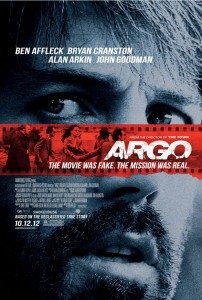



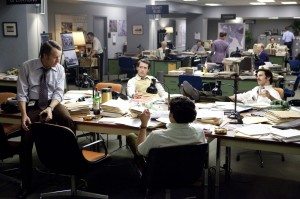
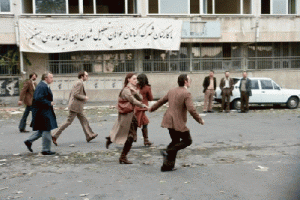





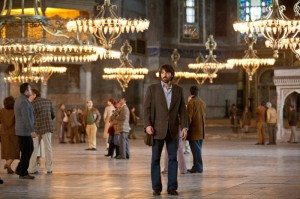

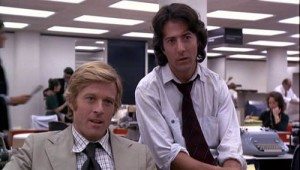
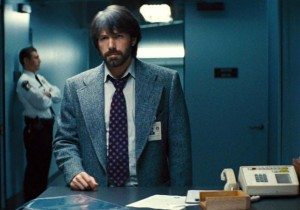

I love your posts SB, but I think you got this one wrong. I don’t disagree with your overall critique; is Argo worth watching again in 5 years? Hardly. But I disagree with your conclusion simply because I could stomach Argo while Lincoln and Zero Dark Thirty left me with sheer disdain for them (for the record, I refused to see Argo for months before giving in and had really low expectations). At least Argo was a competent movie. At least it attempted tension and drama. At least they tried to develop their characters. At least the concept was novel (by today’s standards). Can any of this be said for Lincoln or Zero? Lincoln doesn’t even have a compelling title! They may as well have just called it ‘Movie’.
I had much less disdain for Argo (perhaps because I got to watch it in the comfort my own home, unlike the other two.) The other two films were so poorly constructed in my opinion that Argo should not even be put into company with them. But perhaps most significantly (and offensively), Lincoln and Zero exploited two of the most important stories/events in American history, while Argo chose an event that I was not very familiar with. If Argo’s portrayal of the Iranian hostage crisis was as hamfisted as the other two films are with their topics, would I care? Would I even know?
Despite its faults, Argo was not only more competently produced, but more entertaining and apparently far less exploitative than the other two (for example, it was reported that Lincoln was purposely released shortly after the presidential election, while Zero was released about 18 months after Bin Laden was killed. Only the Lifetime channel can turn around their properties as quickly and with comparable quality!).
Is Argo the worst of 2012? No, I think it is far superior to at least Lincoln and Zero, such that I had to post this rant in your comments!
We appreciate rants in comments. Thanks! I’m sure the Academy is happy to know that movie lovers across the internet are debating which movie is the worst of the year, Lincoln, Argo, or Zero Dark Thirty. I admit it’s a tough call between them, and when you add in Life of Pi, I find myself on the verge of crying blood.
You’re right about the poor construction of Lincoln and ZDT. But as I was trying to get at, what so exasperates me about Argo is the sheer banality of it. Everything about it is so depressingly by the numbers. Yes, they certainly attempted tension and drama. The results were to me as I wrote above: empty, emotionless, meaningless.
I think it’s just a matter of opinion at this point as to which beloved Hollywood Imortant Film is indeed the worst.
So given Sunday’s results, at first I thought “the academy clearly does not read your blog.” But after further analysis, I think the academy must clearly read your blog and has chosen each winner out of sheer malice!
I know! What did I ever do to them? I see their movies, I watch their show…do I have to love them, too? Is that it? Sigh…
I didn’t like this much either. I couldn’t put my finger on why but this is on the money.
And as is my standard responses to posts on here I should also say that I’ve never watched 3 Days of the Condor, The Parallax View or All The Presidents Men.
I do have Coppola’s The Conversation at home waiting to be watched though.
so many movies, so little time… The Conversation is a good one. you might want to check out Antonioni’s Blow-Up too, just to see what Coppola is riffing on.
All The President’s Men and Parallax View should be on your list. both very good, and in the case of the latter, unusually weird. 3 Days of The Condor i’m less enamored of.
Is De Palma’s Blow Out related too?
Just googled it. Seems it is.
yes indeed. but in that depalma kind of way, where it feels more like a cheap rip-off than a riffing on.
I agree 100% with this article. I also agree it is the worst film of 2012, not because it is of the lowest quality, but because it is held with such high prestige for being merely a passable quality film. It did all the right things to manipulate casual audiences into thinking it was a good film.
so for me it is the worst movie based on what it represents. Paint by numbers film making, hollywood politics, hollywood WORSHIP, and America loving semi-propaganda.
yep, that about covers it. ultimately, it couldn’t be any more bland, safe, or self-important.
I enjoyed your critique immensely. There are even more fabrications/manipulations in Argo you could have called upon to sustain your argument. (Such as the scene where Mendez happens upon the “Argo” script.) There’s also the political angle (glamourizing America by pretending it had a larger role in the extraction; ridiculous, stereotypical portrayals of Iranians), which makes the film even more annoying (but also further explains why it won over American audiences). Anyway, great criticism. Thanks.
Actually, Argo glamourizes America (and the stereotypically rugged American male) while also criticizing it. Mendez twists the American government’s arm into freeing the hostages (in the movie). This is entirely fabricated. The film shows a classic American icon (rugged individual, family man) setting the American government straight through a heroic action. It’s all completely false, historically speaking. Why choose this historical situation to create that story? It’s odd, I think.
It’s just an unimaginative movie. Take a real story with real human drama, reduce it to simple minded stereotypes, and hey presto! Oscars!
Thanks for stopping by. I can only hope that others, depressed by the latest in Ben Affleck/Batman news, and thinking, ‘but Argo was terrible!’, also find we kindred souls…
I just watched this movie and Im so surprised that it won all these awards (Best movie? really??) and has a 7,7 on imdb, 96% on Rotten Tomatoes. For me it was boring and annoying, especially the “patriotic and heroic” parts. And then I read that all of the drama in this movie didnt even happen…
I think Im done with Hollywood movies for a while.
It would seem the masses remain easily hoodwinked by tripe like Argo. Glad to see you are not one of them.
The thing is, how and where do I find quality movies? Especially movies of the “drama” genre, with good acting, real emotions and the type of movies that make an impact and make you think about the movie for the next couple of days. Just real human stories and no bs. Can you help me out? :)
I liked your comments very much and they taught me about films too. It reminds me of the absurdly trashy film about the Russian canibal killer Chikatilo, Citizen X with Donald Sutherland. Again, the CIA helped save the day there.
Btw other types of movies, like the more absurd/surreal ones are welcome too. Examples Pulp Fiction, The Big Lebowski…
We can and we will! All the films we recommend—for the reasons you describe above and more—are collected right here: https://www.standbyformindcontrol.com/i-like-to-watch/
You can also see the list of all the films we’ve discussed on this site here (https://www.standbyformindcontrol.com/all-movies-on-mind-control/) and see what sounds good to you.
Thanks Evil Genius, I will definitely check it out!